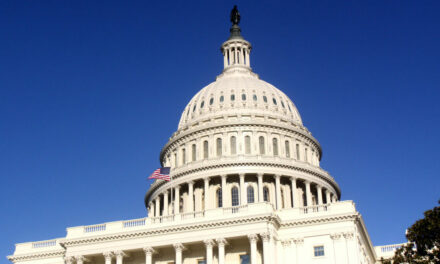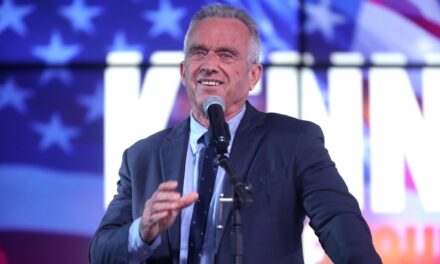We support our Publishers and Content Creators. You can view this story on their website by CLICKING HERE.
As he conceded Wisconsin’s U.S. Senate election this week, Republican Eric Hovde raised legitimate questions about election administration in Wisconsin and in the swing state’s largest city. With vote tabulation machine security breaches and other election integrity issues again dogging Milwaukee’s ballot count, the questions were understandable. The messy Election Day caused Ron Johnson, Wisconsin’s senior senator, to conclude that Milwaukee election administration was as “grossly incompetent” as he’s ever seen.
But the usual suspects in the propaganda press hammered Hovde for not conceding until nearly two weeks after the election and raising “debunked election conspiracies.” They hinted or outright accused the Madison Republican of being an “election denier” — one of their favorite, phony scarlet letters — for weighing a costly recount of an election he appears to have lost to incumbent Democrat Sen. Tammy Baldwin by less than 1 percent. And many of the accomplice media accounts said nothing about Sen. Bob Casey, D-Penn., dragging the swing state through a lengthy, bitter, and costly recount, demanding counties count invalid votes even as his Republican opponent, Dave McCormick, has been declared the winner.
In his concession video, Hovde again noted the “many troubling issues,” including Milwaukee’s usual morning-after absentee ballot count release. An Associated Press piece insisted that “Republicans, Democrats and nonpartisan election leaders all refuted the claims of impropriety Hovde made.” The story did not note that election observers, including Johnson and Wisconsin GOP chairman Brian Schimming, raised concerns about the counting of some 108,000 absentee ballots beginning well behind schedule on Election Day and the discovery of 13 ballot tabulators unsecured, apparently necessitating the recount of more than 30,000 absentee ballots.
‘Red Mirage’ Prediction
While it is true that state law bars election officials from counting the ballots until after the polls open at 7 a.m. on Election Day, the vote count, according to multiple sources, did not get underway until nearly three hours after the opening bell.
“Republicans and Democrats alike, along with state and Milwaukee election leaders, warned in the days and weeks leading up to the election that the Milwaukee absentee ballots would be reported late and cause a huge influx of Democratic votes,” the AP reported.
In fact, the apparently clairvoyant Ben Wikler, chairman of the Democratic Party of Wisconsin, told MSNBC the day before the election that Republicans could expect a “red mirage” in Milwaukee — leading to big wins for Democrats.
“So, in Milwaukee, you’ll see 100% of precincts reporting before you see the numbers that come out of those early votes in person, and those absentee ballots, which, my guess is, are heavily weighted toward Harris supporters,” Wikler predicted on the leftist news network. “So, that means that you’re gonna see a red mirage, where it seems like Trump is doing better than he actually is because they haven’t counted and reported those absentee ballots yet, and then the blue shift when those ballots are introduced to add to the totals. That could be in the middle of the night. It certainly was in 2020.”
It certainly was. Curiously so. As The Federalist has reported, a liberal activist tied to the infamous Zuckbucks grants of 2020 congratulated Milwaukee’s election administrator for “delivering just the margin needed at 3:00 a.m.” for Democrat Joe Biden to beat President Donald Trump in Wisconsin. The email, obtained through open records requests, certainly didn’t bolster confidence in Democrat bastion Milwaukee delivering “free and fair elections.”
This time around Trump won the swing state by more than 29,000 votes, about the same number by which Hovde lost the Senate race.
Incredible Turnout
Hovde also raised concerns about voter turnout topping 100 percent in some Milwaukee precincts. Milwaukee election officials, defended by their pals in corporate media, said, Nothing to see here. It’s completely normal. They noted that Wisconsin’s law allowing same-day voter registration on Election Day at times will push turnout numbers beyond 100 percent.
Milwaukee’s Ward 158, for instance, saw turnout at nearly 106 percent, according to the city’s unofficial election results. The ward counted 1,196 total registered voters as Election Day dawned, but took in 1,263 total ballots thanks to same-day registration.
Ward 186 saw voter turnout at 126.5 percent, according to the city. The ward’s registered voter total going in was 1,078, but it saw nearly 300 more ballots cast by the time the polls closed.
And Ward 335 posted 148.5 percent voter turnout — beginning with 280 registered voters, ending Election Day with 416 ballots cast.
Observers told The Federalist they saw long lines of same-day registrants turning out to vote on Election Day. Election integrity deniers say there’s nothing wrong with that.
But election law expert Hans von Spakovsky said voter integrity has taken a beating in the 23 states and the District of Columbia where same-day registration is the law. The former member of the Federal Election Commission and manager of the Heritage Foundation’s Election Law Reform Initiative, said Election Day voter registration is why a lot of states score so badly on the foundation’s Election Integrity Scorecard. Wisconsin ranks 11th, helped by its strong voter ID law and ballot harvesting restrictions and hurt by its wide open same-day registration law and lax citizenship verification standards.
“When somebody registers and immediately is handed a ballot to vote, you have no opportunity whatsoever to verify that any of the information that they’ve given to you is actually accurate,” von Spakovsky told me Tuesday on the “Vicki McKenna Show” in Milwaukee.
‘History Repeating’
Wisconsin’s largest city has a history of trouble on the same-day front.
In 2008, a Special Investigations Unit of the Milwaukee Police Department report on voter fraud in the 2004 presidential election found that, “The reports of more ballots cast than voters recorded were true.”
Referring to a polling location at the University of Wisconsin-Milwaukee, the report noted that “over 10 percent of the ballots cast in Ward 39 during the 2004 General Election were not properly certified by the Election Inspectors or were ineligible to be cast in this Ward.”
“Over 2600 additional persons who do not live in Sandburg Hall are registered and able to vote from an address where they do not reside,” the report stated.
In conclusion, the report advised:
“It is the opinion of Task Force investigators that more than any other recommendation we could make, our investigation has concluded that the one thing that could eliminate a large percentage of fraud or the appearance of fraudulent voting on any given Election is the elimination of the On-Site or Same Day voter registration system… Given the inability of Election Inspectors to check the eligibility of a voter on the day of any election, there is no other way to ensure that only eligible voters are voting on Election Day.”
As then-Wall Street Journal columnist John Fund reported at the time, the PD’s investigation found that during the race between Republican President George W. Bush and Democrat challenger John Kerry, there had been an “illegal organized attempt to influence the outcome of an election in the state of Wisconsin.”
“Among the problems cited were ineligible voters casting ballots, felons not only voting but working at the polls, transient college students casting improper votes, and homeless voters possibly voting more than once,” Fund wrote. “The report said the problem was compounded by incompetence resulting from abysmal record-keeping and inadequately trained poll workers.”
The Milwaukee Election Commission defended its election administration team from the latest round of criticism.
“The MEC celebrates the dedication of Milwaukee residents to participate in the democratic process and is fully confident that Mr. Hovde’s accusations lack any merit,” the commission said in a statement. “Milwaukee voters can rest assured: the MEC conducted a fair, accurate, and secure election that fully protects voter rights and preserves the democratic process,” the statement said.
Von Spakovsky is not so confident. He said the Election Day problems feel like “history repeating itself in Milwaukee.”
“My reaction was, ‘Oh, no, not again,’ because it’s like election officials there just can’t seem to run elections very well. They just seem to have these kind of problems every election,” he said, adding that state officials should conduct an “intensive audit” of Milwaukee election operations.
Matt Kittle is a senior elections correspondent for The Federalist. An award-winning investigative reporter and 30-year veteran of print, broadcast, and online journalism, Kittle previously served as the executive director of Empower Wisconsin.

 Conservative
Conservative  Search
Search Trending
Trending Current News
Current News 





